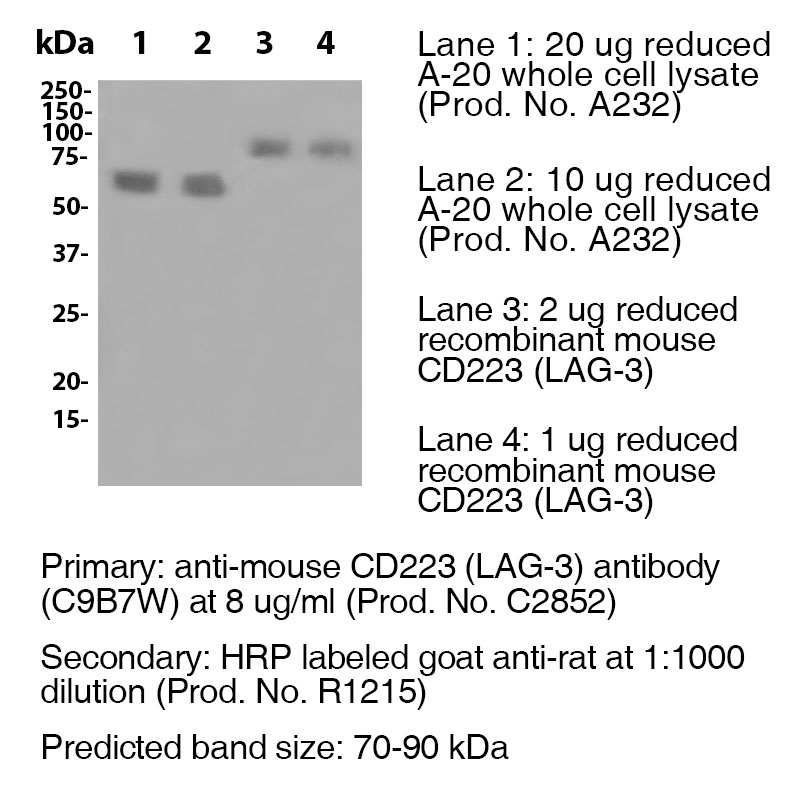Anti-Mouse CD223 (LAG-3)- Purified in vivo PLATINUM™ Functional Grade
| Code | Size | Price |
|---|
| LEI-C2852-1mg | 1.0 mg | £283.00 |
Quantity:
| LEI-C2852-5mg | 5.0 mg | £456.00 |
Quantity:
| LEI-C2852-25mg | 25 mg | £1,335.00 |
Quantity:
| LEI-C2852-50mg | 50 mg | £1,938.00 |
Quantity:
| LEI-C2852-100mg | 100 mg | £2,741.00 |
Quantity:
Prices exclude any Taxes / VAT
Overview
Host Type: Rat
Antibody Isotype: IgG1
Antibody Clonality: Monoclonal
Antibody Clone: C9B7W
Regulatory Status: RUO
Target Species: Mouse
Applications:
- Blocking
- Functional Study
- Immunoprecipitation (IP)
- In Vivo Assay
- Western Blot (WB)
Shipping:
2-8°C
Storage:
Functional grade preclinical antibodies may be stored sterile as received at 2-8°C for up to one month. For longer term storage aseptically aliquot in working volumes without diluting and store at -80°C. Avoid Repeated Freeze Thaw Cycles.
Images
Further Information
Antigen Distribution:
CD223 is expressed on T regulatory cells, activated T cells and NK cells.
Concentration:
? 5.0 mg/ml
Conjugate/Tag/Label:
Purified in vivo Functional Grade, in vivo PLATINUM™
Format:
This monoclonal antibody is aseptically packaged and formulated in 0.01 M phosphate buffered saline (150 mM NaCl) PBS pH 7.2 - 7.4 with no carrier protein, potassium, calcium or preservatives added. Due to inherent biochemical properties of antibodies, certain products may be prone to precipitation over time. Precipitation may be removed by aseptic centrifugation and/or filtration.
Formulation:
This monoclonal antibody is aseptically packaged and formulated in 0.01 M phosphate buffered saline (150 mM NaCl) PBS pH 7.2 - 7.4 with no carrier protein, potassium, calcium or preservatives added. Due to inherent biochemical properties of antibodies, certain products may be prone to precipitation over time. Precipitation may be removed by aseptic centrifugation and/or filtration.
Long Description:
LAG-3 is a 70-kD, type-I transmembrane glycoprotein within the Ig superfamily with four extracellular Ig-like domains (D1 to D4) and is structurally homologous to CD4. LAG-3 is a cell surface molecule with various biologic effects on T cell function. It has been reported to be involved in Treg suppressive function. It negatively regulates cellular proliferation, activation, and homeostasis of T cells, in a similar manner to CTLA-4 and PD-1. Human LAG-3 is approximately 70% homologous with murine LAG3, and it binds MHC class II molecules with higher affinity than CD4. As an immune checkpoint receptor, LAG-3 is the target of various drug development programs seeking to expand treatments for cancer and autoimmune disorders. In its soluble form, LAG-3 is being developed as a cancer drug. As an antagonist, LAG-3 antibody can activate T effector cells via the downregulation of the LAG-3 inhibiting signal into pre-activated LAG-3+ cells. In addition, it can inhibit antigen-specific Treg suppressive activity. As an agonist antibody, it can be used to diminish an autoimmune response and is currently being investigated for the treatment of plaque psoriasis.
NCBI Gene:
16768
Purity:
?98% monomer by analytical SEC, >95% by SDS Page
Target:
CD223



